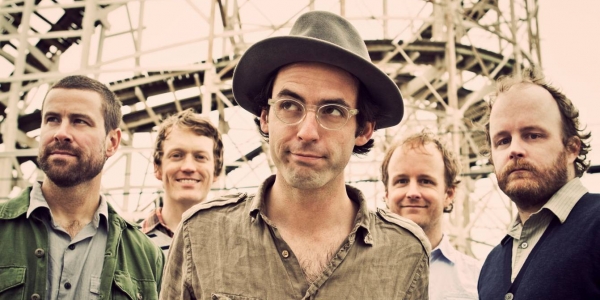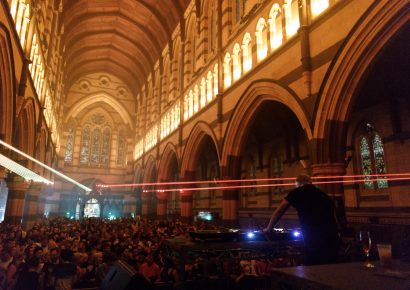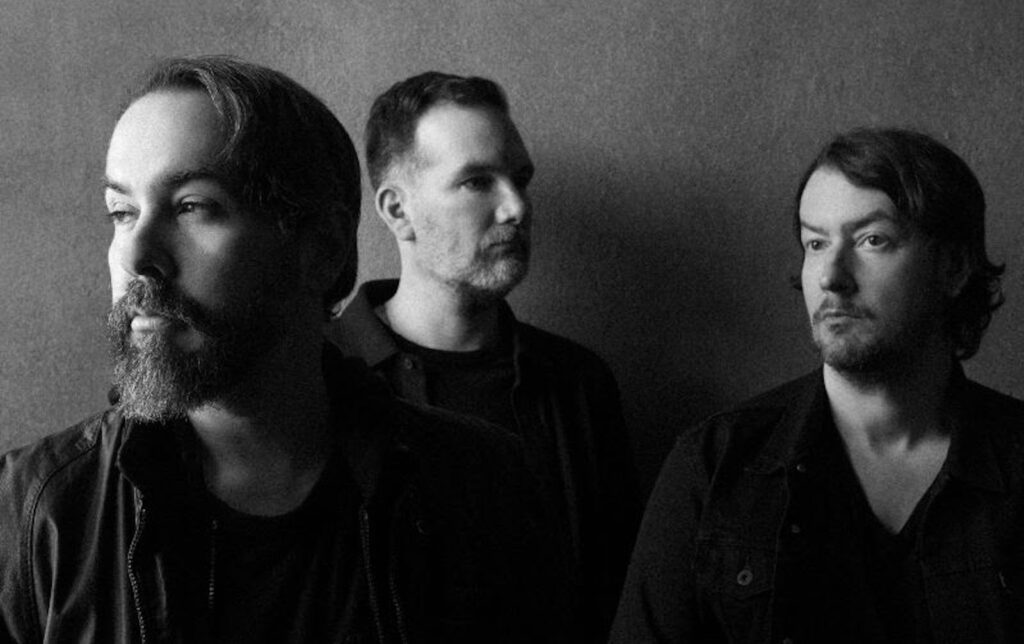“I don’t think anybody even had any idea that we were going to release a record. I don’t think there was anybody talking at all. I think everybody had figured that we were not going to,” Alec explains in a way that makes it hard to decide if he’s being nonchalant or just bored.
“Before the six months leading up to the time when we went into the studio to make it, I don’t know if I really knew what was going to happen. We had all kind of reconvened,” Alec says. “I couldn’t tell. I couldn’t tell if we were going to be available, or if we would actually want to do it.”
This is part of the band’s appeal, existing as they do in a kind of piecemeal universe of fragmentary ideas, concepts and chance opportunities. Alec can’t even be sure if his recent solo record Skin And Bones had bled into the writing of Hysterical or not.
“I guess it must have in some way, but I didn’t approach it in the same way,” he states. “I mean for one thing, I knew who I was playing with. You know, they have their own way of doing things, so it’s going to turn out differently. I tend to try to react to how other people approach a relatively simple idea and then move on from there.
“These days it’s a little bit different,” he continues. “The stuff that I’m trying to put together probably doesn’t leave too much room for outside consideration. But that said, everything just changes as we go along, that’s the nature of making a record. Plan to be surprised, I guess.”
Alec conveys his thoughts in such a calm, measured fashion that one wonders if he’s doing nitrous bulbs to mask an some monster anxiety attack, or if this band really just didn’t have to deal with the concept of pressure while making Hysterical.
“I think the only pressure that might have come about was the idea of kind of recapturing that style that um, that we had naturally, I suppose, when we began,” he explains. “That is to say, the pressure of making sure that there was in fact something that held us all together. And that took a little bit, especially after taking some time off – it took a second to understand why the project was special and to understand how to make it so, again.”
What eased this process – and eventually added to it – was some focus through a rehearsal space that Alec had set up, simply known as The Barn.
“For a long while we had been working on this material, and I had been recording what we had been doing in the Barn, and I think we had gotten through the stages of ‘exhilarating’ and ‘boring’ and etcetera etcetera, while there. And by the time we got to the studio to actually put it down, it could only kind of ramp up. We knew that we were really doing it for real, you know what I mean, so it started to come together and actually make sense overall, rather than pieces, bits and pieces, which was kind of what I was doing.”
A really striking aspect of this album is just how far removed it is from the shambolic circus of their debut. The pop moments are more streamlined, and as the layers of noise peel away, a flowing dreamscape quality takes hold. Aspects and tracks reveal themselves in their own time. A current standout is a little gem called Ketamine and Ecstasy, which beautifully lines up the extremes of a form of living death with a compressed sense of happy life.
“I like that, and somebody else has pointed that out. That’s very much the case. On a relatively simple level, that song has more or less to do with the idea of self-medicating to distract oneself from what’s going on. That idea is relatively simply to represent both sides of the same coin,” Alec almost reluctantly explains.
Decent records with layered depth have a tendency, over consecutive listens, to conjure specific, personal mental imagery. So it came as a shock to view some of the clips the band have posted on their site, known as ‘The Barnyard Sessions’. It clashed with this strange little world that had been built up in the mind’s eye.
“Yeah… in The Barn it was just a bunch of guys in a barn,” Alec laughs. “I’ve had conversations with friends of mine about preserving the ah, that quality, sort of dreamscape quality. It’s like to imagine y’know, when David Bowie was doing Low And Heroes, or something like that, wearing a Ziggy suit and holding a cigarette during every song, or whatever. Yeah, something like that…but you know, at the end of the day, a lot of these videos that I have seen recently of people performing material in the studio – for example: Beck doesn’t do it on his own records, but I don’t know if you’ve seen those sessions that he does at his studio? And they cover other people’s records? He sort of pulls away the mystique and the magic of what happens in the studio. But at the same time, for me at least personally, it’s very revealing. It does capture the performance, and also it’s not overdone, it’s not overcooked. That’s actually how it is. For me that sort of thing is interesting. In a way, the dreamscape quality comes from somewhere else, it doesn’t come from necessary imagery.”







